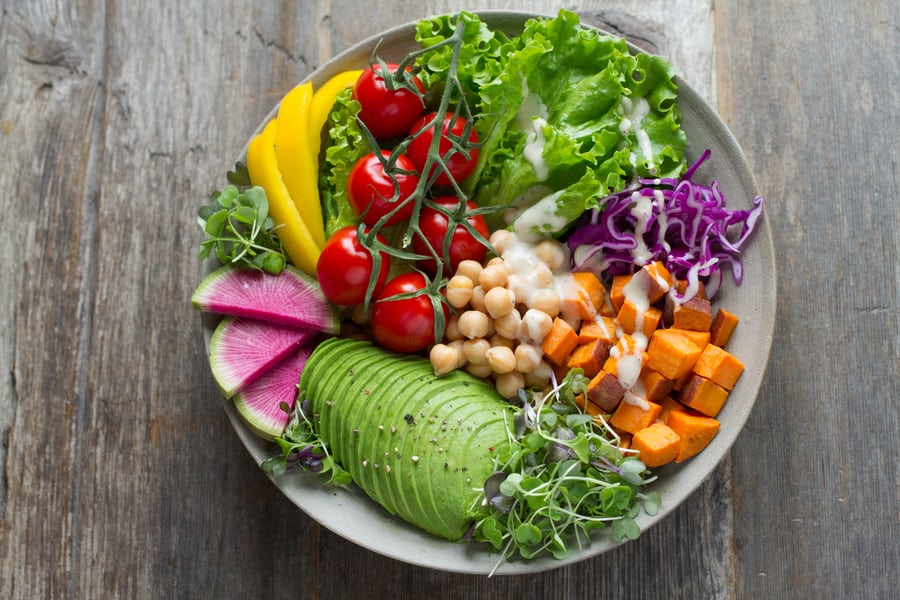The term “stress-eating” is most commonly associated with your body being unable to dictate the amount of food intake due to the physical impacts of stress. This could result in the development of unhealthy eating habits, excess body fat, and even a slight impairment in brain function.
When a person is stressed or anxious, their body elevates cortisol levels, causing a craving for sugary or fatty foods. Although cortisol production is a regular occurrence in the human body, too much of it leads to imbalanced chemicals in the brain, in turn resulting in detrimental habits (such as over-eating).
Stress-eating is the easy way out when feeling troubled or disquieted. Although you may feel at ease for a short period of time, your body will not thank you in the long run. Foods like fruits, vegetables, nuts, and lean meats will leave you with more energy and mental acuteness than something fatty or sugared. Here are seven foods (and their benefits) to try as your new substitute for stress relieving meals:
- Go Green
Although leafy green vegetables such as arugula or kale aren’t always the most delicious, they are rich in vitamins, nutrients, and folate. Folate is categorized as a B-vitamin and is requisite to produce red and white blood cells, as well as DNA and RNA. Scientific research has shown that not only does folic acid reduce stress hormones, it also drastically lowers the risk of newborn children having birth defects. A study made by the Journal of Affective Disorders focused on 2,800 middle-aged and elderly people; it was found that those who consumed foods lush with folate were less likely to experience symptoms of depression and anxiety.
2. Oatmeal
Oats are perceived as the healthiest grains on Earth. They harbor many important antioxidants, minerals, fibers, vitamins, and complex carbohydrates. Oats and oatmeal have many psychological and physical benefits, including lower blood sugar levels, lower risk of strokes or heart disease, and improvement of immunity. Shengmin Sang, a professor of human health at North Carolina A&T State University, said that “Eating whole grain oats can prevent diabetes and lower cholesterol levels, which could prevent cardiovascular disease. Based on the existing evidence, eating oats and oatmeal is definitely good for our health, both mentally and physically.”
3. Yogurt
Yogurt is known to be one of the most cleansing and detoxifying foods. Although this may sound awfully peculiar and untrue, the bacteria in your gut could be contributing to how stressed you are. Our brain and gut communicate through body chemicals, which is why stress has the ability to precipitate gastrointestinal symptoms (nausea, diarrhea, vomiting, etc). Studies have shown that consuming the probiotics in natural yogurt (not the yogurts with heavy sugar or flavorings) reduce stress levels in certain parts of the brain. Although this study was small and best be reenacted twice for good measure, it’s no doubt that yogurt is a good addition to anyone’s diet.
4. Blueberries
Whilst all berries are exuberant in antioxidants, blueberries are the best to consume when feeling stressed. The phytonutrients found within blueberries help your body respond to stress, as well as organically producing white blood cells (which inevitably play a predominant role in immunity). When we’re anxious, our bodies discreetly crave Vitamin C, a vitamin that helps replenish and repair. Blueberries are bursting with Vitamin C, as well as countless antioxidants which have been shown to hinder stress.
5. Dark Chocolate
Dark chocolate is probably one of the healthiest foods on the entire planet (if not over-consumed). It is packed with vitamins and nutrients that assuage stress, help with concentration, boost immunity, improve circulation, and lower blood pressure. According to a study made by several students in Harvard University, cocoa has an abundance of flavanol, a plant chemical that supports and keeps the heart healthy. Dark chocolate has a commendable profusion of zinc, magnesium, flavanol, copper, iron, and phosphorus.
6. Seaweed
Seaweed is a common ingredient used in sushi, some salad dressings, and sometimes as a texture modifier. So for all my sushi lovers, I have some great news for you; the seaweed you consume is rich in iodine and disparate minerals that play a big role in mitigating stress. Studies have shown that even just a quarter of cup seaweed can pack over 275% of the daily iodine value.
7. Chamomile Tea
Chamomile tea aids with stress, sleep problems, and muscle tension. Substituting melatonin or other sleep pills with just a simple cup of chamomile tea is a much healthier and more favorable option. Chamomile has been shown to enhance sleep, provide a sense of tranquility, alleviate stress, and adequately balance out chemicals in the brain.
Thank you for taking the time to read this article and acquaint yourself with some of the most advantageous foods in terms of attenuating stress. Make sure to check out my other articles on ThriveGlobal here.


